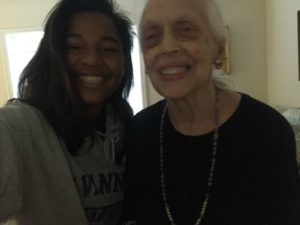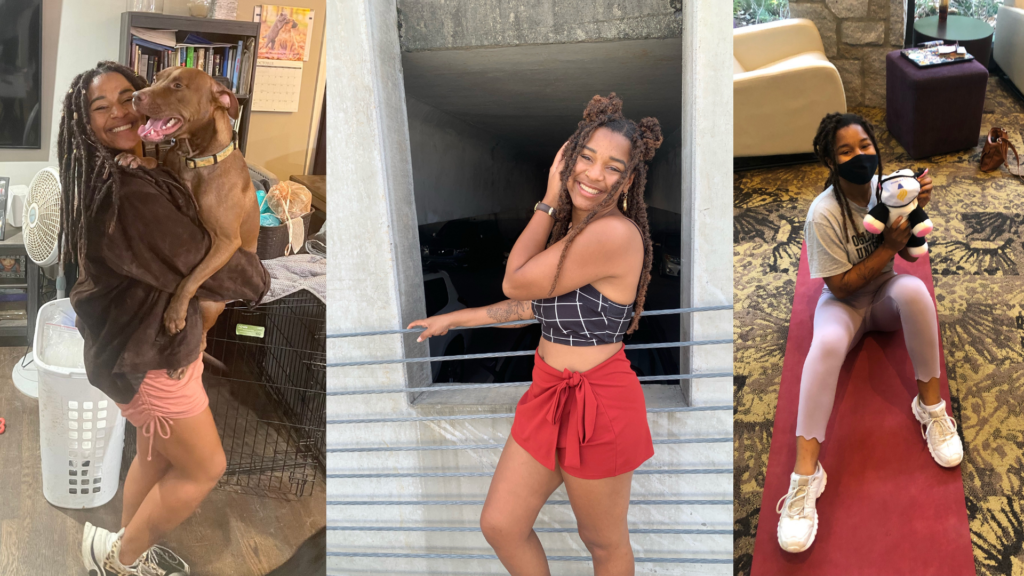Aurora Santifer ’23 is a sociology major and Spanish minor.
“I used to work at a retirement home. In high school I worked there for a year and a half. And that’s when I first started developing my sense of empathy and patience. Because that’s when I first realized how people are being treated—and this isn’t indicative of all retirement homes, just the one I was working at—but it was very common for people to drop off their parents, and then just never visit them. Ever! And they would die! It just blew my mind.

Aurora and Diane.
There was this one woman I connected with in particular. Her name was Diane. I met Diane one day in the dining hall. I was a server, but in the retirement home, it’s basically all hands on deck. I was always in their rooms, making sure they were eating, and stuff like that. So, Diane was just in the dining hall one day, and she comes up to me and she goes, ‘Where is my room?’ and I was like, ‘I don’t know! I don’t even know who you are!’ But I was concerned. I didn’t know anything about her, but I was like, we’ve got to find this girl’s room. So, I helped her find her room, and I went in and I sat with her, and she just showed me all the pictures she had of her kids. And she used to be famous, I think—I’m still kind of unclear on that one. After about five to ten minutes of talking with her, I realized she had dementia. I didn’t realize that at first. But she would keep asking the same questions, and that’s when it clicked for me.
After that, I started visiting Diane pretty regularly. Now that we both knew where her room was, I would drop by on my breaks, and I would sit with her, and I would just do my homework sometimes in her room. She could speak, but we never really had conversations. She would just be like, ‘Where do you live?’ and I would say, Atlanta. ‘Where?’ By Lenox. ‘Where?’ On Peachtree Road. ‘Ohhhh.’ And that happened every 10 minutes for like a year. ‘What’s your name?’ Aurora. ‘What are you doing here?’ I’m a server. ‘How do you know me?’ I just saw you one day, Diane. We’re friends. ‘Oh, okay.’
We would just do that over and over again. And I would answer her every time. I just felt so bad, because she showed me all these pictures of her kids, but I checked the visitation book, and people hadn’t visited her in years. Nobody.
So I’m like, you have no friends; you don’t know where your room is; everyone’s so fed up with the fact that you have dementia that nobody wants to deal with you anymore, so you just sit in your room and watch TV for years. That’s so sad. Every once in a while, though, she’d pop out and play the piano. That was really nice, because she would just suddenly have these little windows of memory, and she’d be like, I’m going to go play the piano. And we’d all be like, girl, you didn’t even know you played the piano 10 minutes ago!
So then one day, it was Christmas. I worked all the holidays, and I would always come home crying because their families weren’t there. And I was like, this is so sad. Because it’s Christmas, and I just have little reindeer antlers in, and this Christmas is going to be some random 18-year-old girl you don’t know with reindeer antlers serving you chicken. So, one Christmas, a nurse came to get me and was like, your friend is sick. And I was like, who? And she said, your friend, the one that you hang with. And I was like, Diane? She said, your friend’s not doing well. So I went to go check on her. She was in bed, tubes in her neck. She fell, apparently, and I guess nobody found her. By the time I saw her, she was in the bed, and she was just staring at me. She would blink, but she couldn’t really do anything, and the nurse was like, you need to say goodbye, because she’s not going to make it much longer.
I went over, and I just stared at her. This is so messed up…that none of your family members are here, that none of your friends are here, it’s just this nurse that doesn’t care about you. I just stared at her and said, this is ridiculous. I was just looking at her and saying, this is crazy, Diane. This is crazy. And then she died that night. It was crazy. And then what did I see the next day? All her family members pulled up, took her stuff, and left.

Aurora hopes to use her sociology degree to help those without a voice.
All that to say, that was a very impactful moment in my life. Or theme, I guess. Because that’s when I was like, people just treat old people like they’re not real. Like, oh, they’re going to die soon, so we don’t take them seriously. But they were us once. Which is just crazy to think about. That they were once in college, and in a sorority, and now they’re old. And they never thought they’d get there—I never see myself as an old person, I just think I’m going to be young forever. And that’s what they thought. They’re just people. Everyone’s just a person, and we need to treat them like that.
Don’t treat Diane like she’s just an old lady who has dementia so she’s on her way out, so just give her some food and wait. Treat Diane like she’s a daughter, or somebody’s sister, who was once studying in college, and got her degree, and probably was struggling with student loans, and got a dog when she was 17—a person, she’s a person. With preferences, and maybe she doesn’t even like the food you’re serving her, and maybe she wants a little more salt on it because she likes her food salty.
That was just really big for me. And at the time, I was also falling out of organized religion, so I thought, this belief is what’s going to work for me. Just remembering to always treat people like people, and always sending love out. So that’s why I’m always saying to people that I’m sending love your way. I think I say that at least three to four times a day. Because I’m sending love to you, because you’re a human, and I don’t know how you got to where you are, but you’re here now, and let me know how I can help. So, it’s kind of a bittersweet story with Diane. Because that definitely changed my life, but that was nuts. I was really bothered by that. And I quit soon after that, because I was like, I can’t do this job anymore. I can’t work here, because these people aren’t being treated like people.
The incarcerated population, the unhoused population, and the elderly are some of the biggest groups that get treated like aliens. Did you ever see the art exhibit— ‘Art from the Inside?’ I’ll admit that I came in with totally preconceived notions of what the art was going to look like. And I was totally blown away. That’s why I love art. I think art is so powerful. I myself am more into music than the visual arts, but I love looking at any art because it really is just the nonverbal expression of the human experience.
Like a chord. You feel a chord—you can’t explain what it is, but you can feel it. A color—you can see a color and feel a certain way. That’s the common ground that connects all of us in the way that words can’t describe. It transcends language and understanding. You see something, you hear something, and you feel something that connects all of you that you can’t describe. You can’t even write it down, you just play the chord again. And you’re like—y’all feel that? Yeah. And you play it again.

